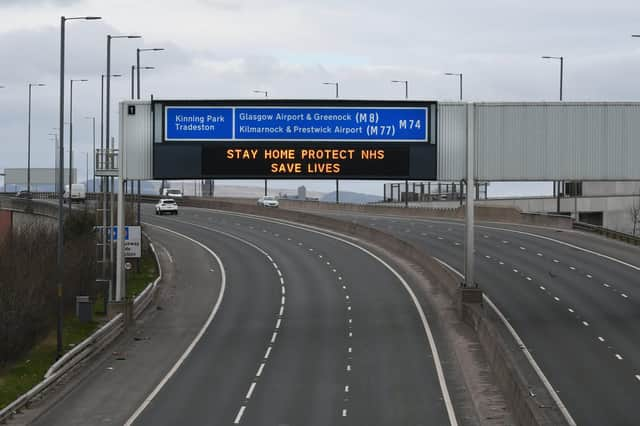Understanding business risk in the ‘next normal’ - comment


Firstly, that even though the curve may be flattening, we remain far from restrictions being lifted. Secondly, when current social distancing measures are relaxed, “exit” will not be a lightswitch moment. Our departure from this phase of the Covid-19 crisis response will be gradual, and the normal to which we return will not be what we knew before.
Ostensibly, the public has been united by living a common experience. Non-essential shops are shuttered to all, and leisure options closed off no matter who you are. Suffice to say, though, that the past month will have felt very different to those with a large garden than for families in flats with young children, or those living alone without regular contact with anyone.
Advertisement
Hide AdAdvertisement
Hide AdSimilarly, whilst the immediate impact of government-mandated social distancing will have been felt by every business, the experience has been far from universal. At one end of the scale, the principle challenge for some will have been to facilitate a mass transition of colleagues to home working. At the other end, countless businesses have found themselves and their sectors thrown into an existential crisis.
In thousands of cases across Scotland, their survival is now wholly contingent on the effective functioning of business support initiatives hastily cobbled together by governments. What, then, if anything, might unite business as we move towards the “next normal” that may emerge when lockdown restrictions from this first wave of coronavirus begin to be relaxed?
Here, a third grim reality is dawning – that the economic damage wreaked by the virus will have a deep and lasting impact. A global recession is now assured, bringing further and sustained challenges to firms and public finances.
Challenges ahead
Again, the impact of these will not be evenly spread across sectors, but we are all in for difficult months and years ahead, notwithstanding the ongoing public health efforts to keep the virus at bay, pending delivery of a vaccine.In planning for this period of sustained challenge, businesses could be forgiven for training all their sights on coronavirus-related risk stemming directly from the virus or as a result of its economic impact.
To do so would be to overlook other risks (and doubtless, opportunities), from powerful external forces and phenomena that will continue to shape the external environment, above and beyond Covid-19.
Having been prematurely derailed already by the global financial crisis of 2008-09, recognition of the global climate crisis had surged to the top of the risk registers before Covid-19 hit. We should expect this to be one of the earliest political priorities to “thaw” when the worst of this initial wave of the virus has passed.
Similarly, the automaticity of the Brexit process and its associated deadlines, alongside the related drive for a second referendum on Scottish independence, will ensure that constitutional matters will again rear their head.
While we may not know what the next week holds for the business world at this time, it would be wise to assume that these “three Cs” of coronavirus, climate and constitution will play a leading role in shaping the next normal, and the normal after that.
Advertisement
Hide AdAdvertisement
Hide AdThe public policy response to one will closely affect others, though, rendering neat disaggregation and compartmentalisation of these risks a near-impossible task. Instead, businesses might better view these three Cs as legs of a stool, to be assessed in the round, perhaps with their chances of success enhanced (or significantly damaged) by their reputation forged by their immediate response to the crisis.
Applying this view to business planning may not equip organisations with a crystal ball, but it will assist in scenario-planning, and in looking around corners to identify probable public policy interventions and their impact on business, as we continue deeper on our journey through these uncertain times.
Andrew Henderson, director of public policy at Pinsent Masons
A message from the Editor:
Thank you for reading this story on our website. While I have your attention, I also have an important request to make of you.With the coronavirus lockdown having a major impact on many of our advertisers - and consequently the revenue we receive - we are more reliant than ever on you taking out a digital subscription.Subscribe to scotsman.com and enjoy unlimited access to Scottish news and information online and on our app. With a digital subscription, you can read more than five articles, see fewer ads, enjoy faster load times, and get access to exclusive newsletters and content. Visit www.scotsman.com/subscriptions now to sign up.
Our journalism costs money and we rely on advertising, print and digital revenues to help to support them. By supporting us, we are able to support you in providing trusted, fact-checked content for this website.
Frank O'Donnell
Editorial Director
